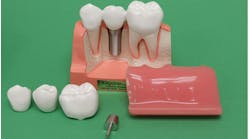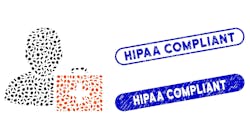Dentistry is a challenging profession. It’s taxing on the body and mind, and your mind is in the driver’s seat more than you can ever imagine. Dualism, the idea that the mind and body exist as separate entities, is a fallacy. According to Rada, “Dentists are prone to professional burnout, anxiety disorders, and clinical depression, owing to the nature of clinical practice and the personality traits common among those who decide to pursue careers in dentistry.”1
I’m one of your colleagues who became disabled from dentistry and sat in my home for more than a year before I found my next calling in our profession. It was a horrible experience that I would not wish on anyone, and the aftereffects lasted for many years.
Because of my experience, mindset and the science of positivity have become paramount. I’m on a mission to help my colleagues and their teams see things differently and lead a different life. After extensive research, learning, and multiple certifications, I’ve come to one primary conclusion: your outlook on life, your patients, your team, and your practice will affect your bottom line.
I’m not saying my ideas here are a cure-all for anxiety, depression, and other mental health concerns. If you need professional help, ask for it. I’ve sought the assistance of professionals for many years, and they’ve helped me tremendously.
When I work with dentists and their teams, mindset and transparent communication make the difference between good and great teams. I overheard one dentist tell his team, “Well, we had a good month, but you never know when things will go south.” Talk about toxicity in action!
There’s hope amid the chaos in dentistry. We’ve all fallen into patterns of thinking that have gotten us where we are today. If you’re feeling stressed and burned out, you can change your patterns. You can choose a different, positive path. Think back to dental school. Just like when you learned clinical procedures, your brain learned a pattern of thinking and muscle memory. Similarly, you can learn different ways of thinking. Patterns of positive thinking can allow your brain to function more efficiently, be open to alternatives, see things more clearly, and be less inclined toward “anchoring” or cognitive bias. You don’t want to rely too heavily on the first piece of information offered (the anchor) when making decisions.
You can teach an old dog new tricks, and there’s a term for this—neuroplasticity. Puderbaugh defined it as “a process that involves adaptive structural and functional changes to the brain. It is the ability of the nervous system to change its activity in response to intrinsic or extrinsic stimuli by reorganizing its structure, functions, or connections after injuries, such as a stroke or traumatic brain injury.”2
So yes, you can learn new thought patterns, and positive thinking will help your practice succeed. But let me be abundantly clear on a critical point: not every day will be full of roses. Happiness is a comparative emotion. We must engage with all our feelings to work through and work past them. I won’t insist that you always be happy, but I want to help you consider alternative thought processes and actions to serve you, your practice, and your patients.
What does research demonstrate? Here are four studies for you to consider as you think about the effect that positivity can have on your practice.
You might also be interested in: Feeling burned out? Try these career rejuvenation ideas
Positivity influences brain function
Barbara Fredrickson’s Broaden and Build Theory substantiated that a broadening effect of our cognitive function is biological.3 The positive chemicals of dopamine and serotonin help us feel and function better. These chemicals allow for additional neural connections and allow us to think more clearly and creatively and become more adept at complex analysis.
Positivity helps us see
A study by Schmitz showed that our mood changes the operation of our visual cortex. Individuals were shown pictures, and those in a negative mood did not process all the details in the pictures; they missed significant parts of the background. Those in a good mood saw all the details.4 In another study by Wadlinger, participants who were trained to selectively concentrate on positive information “looked significantly less at the negative images in the visual stress task following the attention training, thus demonstrating a learned aversion to negative stimuli.”5
Positivity influences diagnosis
We as clinicians need to assimilate large volumes of information to reach a diagnosis, and inflexibility in thinking, called anchoring, even in the face of new evidence, can be detrimental to the diagnostic process.
A study by Estrada sought to investigate the influence of a positive effect on clinical reasoning, anchoring, and efficiency.6 He split physicians into groups who were given medical information to come to a diagnosis. The group that was promised candy (i.e., primed to be positive) demonstrated less anchoring and came to a diagnosis faster than the other groups. Even just a minimal burst of positivity affected their diagnostic acumen.
Positivity influences performance
A study by Bryan assessed the impact of positive moods on students’ feelings of self-efficacy and math performance.7 Students were asked to remember one of the happiest days in their lives before taking a standardized math test. Those who were asked to remember the happy times outperformed the other students not primed to recall such memories. The study concluded that “children in the positive-mood condition completed significantly more problems accurately than children in the no-treatment control condition.”
So, positive brains work better, process more efficiently, and allow you to diagnose more accurately without missing as many details. An entire branch of psychology focuses on positivity, and these four studies are just the tip of the iceberg. So, if you’re still with me, how do we encourage, focus, and foster positivity in our dental practices? The research has things covered there, too.
Your relationship with your team matters
The Grant Study, conducted at Harvard, followed more than 268 graduates for 73 years and measured anthropologic, physiologic, and sociologic factors. This was the longest longitudinal study ever conducted.8 What did the study conclude? “The warmth of relationships throughout life has the greatest positive impact on life satisfaction.” Put another way, people make us happy; the people you spend the most time with are your team.
George Valliant summarized several additional points directly related to dental practice.8 He said that financial success depends on the warmth of relationships, not on intelligence. Those who scored highest on “warm relationships” earned an average of $141,000 yearly at their peak salaries (usually between ages 55 and 60). There was no significant difference in maximum income earned for those with IQs in the 110–115 range or with IQs higher than 150.
I’ve worked with teams that truly care for each other, cannot stand each other, and everything in between. I see the light in dentists’ eyes when they talk about a team they love, and I’ve seen the despair when they talk about a challenging team.
Creating a cohesive and happy team is possible. It’s not just important; it’s critical. When I work with teams, we create an agreement, a contract that focuses on what kind of practice they want every day, we discuss how they will show up when there are challenges, and how they can keep each other accountable.
This one exercise can change the face of practice because it opens the door to communication, does not allow sweeping things under the rug, and allows all parties a way to be heard. As my client, Dr. Kate von Lackum shared, “Communication is on a level I’ve never experienced at work before. I can now trust all the team are on board and working together to put excellent patient care as our top priority.”
How you start your day matters
I realize that some of you start each day with a morning huddle and others do not. How do you start your day? What do you focus on? If you huddle, do you only talk about problems? What about the good things?
I ask my clients, did you have a bad day, or did you turn five minutes into 24 hours? Ever heard of frequency illusion? This is a term coined by Stanford linguist Arnold Zwicky. It’s a perception that something you’ve been thinking about or recently learned suddenly seems much more frequent in your environment.9
You’ve probably experienced this when you bought a new car. Suddenly, many people have the same car! You’re now primed to see your new car everywhere. Back to starting your day—if all you talk about is difficult patients, then all you will see are difficult patients. You’re more inclined to see great patients when you talk about great patients. When you focus on the good things, your team is more inclined to see the good things,
Do you need to avoid the bad things? No, just don’t focus on them. Marcel Losada derived a mathematical model showing that the positive to negative feedback ratio is 3:1 necessary to make business teams successful.10 So, if you find yourself with a laundry list of constructive/negative feedback, think about this ratio and which items need to be urgently addressed versus waiting to keep you within the ratio.
Expressing gratitude matters
In his book, Thanks! How the New Science of Gratitude Can Make You Happier, Robert Emmons explains that people who routinely focus on gratitude are more energetic, emotionally intelligent, forgiving, and less likely to be depressed, anxious, or lonely.11 Starting the day with something you’re grateful for is not only important for your mood, but it allows the team to search for things to be grateful for versus searching for things to complain about.
During the pandemic, I often reflected on my first year of disablement from practice—a time of unemployment, hopelessness, and no obvious opportunities. What got me through that dark time were my relationships, mental health professionals, and learning what it truly means to have a positive outlook that’s realistic and not toxic.
It’s safe to say that the science of positivity cannot be ignored. We have collectively navigated through a dark time in history that none of us would like to repeat. As a profession, we’re heroes. We get people out of pain into better functioning states and help foster self-confidence through esthetic procedures. What we do is nothing short of miraculous.
During your most difficult days, I invite you to remember this. Positivity will affect your brain function, visualization, diagnosis, and practice performance. Embracing positivity can affect your relationship with your team, sense of gratitude, and outlook on life. I hope I’ve made a strong enough case for you to see the usefulness of positivity that will affect your bottom line.
Editor's note: This article appeared in the January 2024 print edition of Dental Economics magazine. Dentists in North America are eligible for a complimentary print subscription. Sign up here.
References
- Rada R, Johneson-Leong C. Stress, burnout, anxiety and depression among dentists. J Am Dent Assoc. 2004;135(6):788-794. doi:10.14219/jada.archive.2004.0279
- Puderbaugh M, Emmady PD. Neuroplasticity. In: StatPearls. StatPearls Publishing; 2023.
- Fredrickson BL. The broaden-and-build theory of positive emotions. Philos Trans R Soc Lond Biol Sci. 2004;359(9)1367-1378. doi:1098/rstb.2004.1512
- Schmitz TW, De Rosa E, Anderson AK. Opposing influences of affective state valence on visual cortical encoding. J Neurosci. 2009;29(22):7199-7207. doi:10.1523/JNEUROSCI.5387-08.2009
- Wadlinger HA, Isaacowitz DM. Looking happy: the experimental manipulation of a positive visual attention bias. Emotion. 2008;8(1):121-126. doi:1037/1528-3542.8.1.121
- Estrada CA, Isen AM, Young MJ, Positive affect facilitates integration of information and decreases anchoring in reasoning among physicians. Org Behav Hum Decis Proc. 1997;72(1):117-135. doi:10.1006/obhd.1997.2734
- Bryan T, Bryan J. Positive mood and math performance. J Learn Disabil. 1991;24(8):490-494. doi:10.1177/002221949102400808
- Vaillant GE. Triumphs of Experience: The Men of the Harvard Grant Study. The Belknap Press of Harvard University Press; 2012. doi:10.4159/harvard.9780674067424
- van der Meulen M. Are we indeed so illuded? Recency and frequency illusions in Dutch prescriptivism. Languages. 2022;7(1):42. doi:10.3390/languages7010042
- Losada M. The complex dynamics of high-performance teams. Math Comp Model. 1999;30(9-10):179-192. doi:10.1016/50895-7177(99)00189-2
- Emmons RA. Thanks! How the New Science of Gratitude Can Make You Happier. Houghton Mifflin; 2007.
Martin R. Mendelson, DDS, FIADFE, CPC, is resident faculty with Spear Education and founder of Metamorphosis Coaching. With certifications in executive coaching, team coaching and facilitation, emotional intelligence, and happiness studies, he has spent almost 20 years working with leaders to build happier and more fulfilled teams. Reach him via martinmendelson.com or linkedin.com/in/metamorphcoach/.






